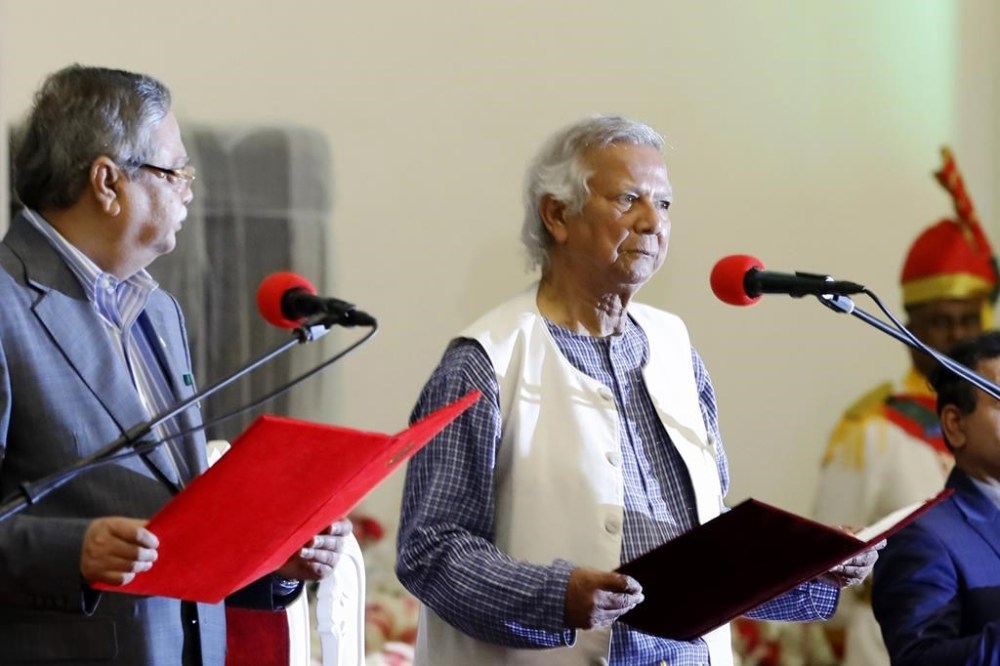Bangladesh’s interim government led by Yunus lifts ban on the Islamist Jamaat-e-Islami party
Advertisement
Read this article for free:
or
Already have an account? Log in here »
To continue reading, please subscribe:
Monthly Digital Subscription
$0 for the first 4 weeks*
- Enjoy unlimited reading on winnipegfreepress.com
- Read the E-Edition, our digital replica newspaper
- Access News Break, our award-winning app
- Play interactive puzzles
*No charge for 4 weeks then price increases to the regular rate of $19.95 plus GST every four weeks. Offer available to new and qualified returning subscribers only. Cancel any time.
Monthly Digital Subscription
$4.99/week*
- Enjoy unlimited reading on winnipegfreepress.com
- Read the E-Edition, our digital replica newspaper
- Access News Break, our award-winning app
- Play interactive puzzles
*Billed as $19.95 plus GST every four weeks. Cancel any time.
To continue reading, please subscribe:
Add Free Press access to your Brandon Sun subscription for only an additional
$1 for the first 4 weeks*
*Your next subscription payment will increase by $1.00 and you will be charged $16.99 plus GST for four weeks. After four weeks, your payment will increase to $23.99 plus GST every four weeks.
Read unlimited articles for free today:
or
Already have an account? Log in here »
Hey there, time traveller!
This article was published 28/08/2024 (495 days ago), so information in it may no longer be current.
DHAKA, Bangladesh (AP) — Bangladesh’s interim government led by Nobel laureate Muhammad Yunus on Wednesday lifted a ban on the Islamist Jamaat-e-Islami party that was imposed by the former prime minister who was ousted in nationwide protests against her rule.
Sheikh Hasina, who fled to India on Aug. 5, had banned the party as a “militant and terrorist” organization and blamed its student wing and other associate bodies for inciting chaos over a quota system for government jobs. The weeks of violent protests and Hasina’s crackdown left more than 600 people dead, according to U.N. estimates.
The Ministry of Home Affairs repealed the ban on Wednesday, paving the way for the party to resume its activities. It still needs to register with the Election Commission to contest polls.

There was no immediate reaction from the party leadership. Jamaat-e Islami has been banned from taking part in elections since 2013, after the Election Commission canceled its registration, a decision upheld by the High Court, which ruled that the party’s charter violated the constitution by opposing secularism.
Bangladesh’s Law Affairs Adviser Asif Nazrul said that Hasina’s ban was politically motivated and not based on ideology.
Mirza Fakhrul Islam Alamgir, secretary-general of the Bangladesh Nationalist Party led by former Prime Minister Khaleda Zia, Hasina’s rival, also had blamed Hasina’s government for the ban that he said was meant to divert attention from the violence in which security officials were accused of using excessive force and causing deaths among protesters.
The Yunus-led government has been struggling to restore political stability and order as police forces and other government sectors are demoralized after attacks by protesters. Compounding the crisis was a devastating flash flood that ravaged the country’s eastern and other regions, killing at least 27 people.
Under Hasina, who was criticized as an authoritarian, thousands of opposition leaders and activists were arrested before the January election that returned her to power for the fourth consecutive term. Human rights groups blamed her for using security forces and courts to suppress the opposition, the charge she denies.
Jamaat-e-Islami was founded during the British colonial rule in 1941 by a controversial Islamist scholar and campaigned against the creation of Bangladesh as an independent state during the war of independence from Pakistan in 1971.
In 2013, a mass uprising in Dhaka led by youth groups, civil society organizations and secular political parties called for the execution of the party leadership for their role in 1971 war crimes.
Most of the senior leaders were hanged or jailed since 2013 after they were convicted of crimes against humanity including killings, abductions and rapes in 1971. The party had formed militia groups to help the Pakistani military during the nine-month war. Bangladesh won independence on Dec. 16, 1971, with the help of neighboring India.
Bangladesh says 3 million people died, 200,000 women were raped and nearly 1 million people fled to India during the war.

